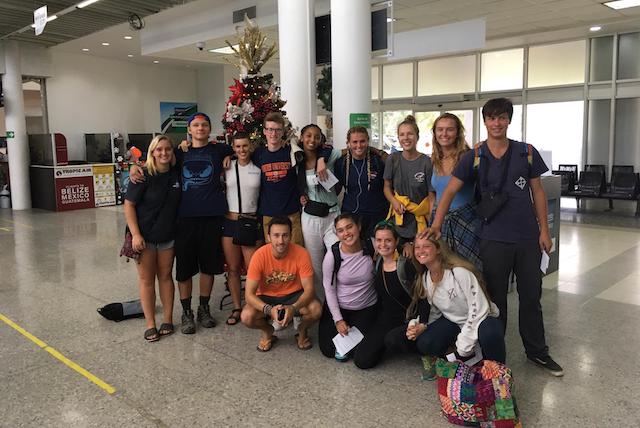As our groups return this week, we know families are excited to welcome students home and proud of all of their hard work over the past months. Taking a gap year is a transformative journey and you may think the experience is over: the truth is, some of the hardest work has just begun.
As students grapple with reverse culture shock, it is important that they feel supported so they can integrate the lessons they gained on their gap year into their daily lives back home. Here are 10 ways you can help.

1. Avoid airport overwhelm
“How was India?” is perhaps the worst question you can ask at the airport – there is no way to authentically answer this question on the spot.
When your son or daughter returns they are probably exhausted and emotionally all over the place. They are happy to see you, but sad to say goodbye to their traveling family and the cultures and people they have grown to love. They probably have not given much thought yet to with whom and how they want to share their learning and transformation. If you pester them with questions right away, you will probably get short, poorly though-out responses.
Instead, let your son or daughter guide these initial conversations. Show interest, but allow them time and space.
2. Limit extravagant choices
In my years as a traveler I have never met anyone returning from significant time in the developing world that has not had an “olive oil” moment.
For me, after a year of living in the jungles of Nicaragua, a friend picked me up at the airport and asked me to get some olive oil at a local supermarket so we could make dinner.
Twenty minutes later he found me standing in the olive oil aisle in tears overwhelmed by the hundreds of brands, sizes and types. (What is extra virgin olive oil anyway?)
Your son or daughter will eventually have their own moments – it may happen ordering a half-caf skinny vente latte at Starbucks, or it may happen over a fancy dinner when they realize the salad costs more than most people earn in an entire week in Thailand.
If this happens right away or too often, it can be hard for them to reconnect with those who don’t tend tp break down in supermarket aisles or at Starbucks counters. If they do, help them to connect with others who can relate.

3. Encourage a slow re-entry
Don’t expect, (or encourage) your son or daughter to jump back into old routines or activities. Priorities may have changed or they may not want to be confronted with so many people right away.
Allow them time to determine what aspects of their old life they want to continue and which aspects they may want to change. Most students’ relationship to technology has shifted. They were not directly relating to e-mail and text messages in the same way we do here in the States.
Lower your expectations that they will get back to you ”right away” and allow them to settle in to the way they want to relate through technology and other old routines on their own.
4. Avoid superlatives. (They’re the worst!)
What was your favorite part?
What was the most fun?
These questions are almost impossible to answer. Your student was gone for several months and had a huge variety of challenging, fun, sad, and transformational moments. Asking these types of questions and focusing on just one or two aspects of the trip can devalue the importance of the other parts of the journey and make them seem less important.
Try instead something specific like: “what was one thing that you learned from your host family in Arequipa? How were they different from your host family in Ecuador? What was it like to be high up in the Andes? Are the stars different in the Southern Hemisphere?”
5. Create intentional time to hear about their trip
Since you followed tip #1 and didn’t pester your son or daughter at the airport, you still have a million questions. Let them know you want to hear more about their experience in whatever way they want to share. Let them know that when they’re ready, you want to set aside several hours to let them share.
If they are not ready that’s okay, but you giving them the time will send the message that you value their growth and transformation and really want to learn about it.

6. Encourage experiential learning and sharing
On Carpe Diem gap year programs, students learn by doing. Why not try this yourself?
Encourage your son our daughter to use props, pictures and demonstrations as they share what they learned. Try cooking a dish they perhaps prepared with a host family. Find the local Asian/Latino/African supermarket – your city probably has one – and have them be your guide. Have them show you some yoga poses they learned or lead you in a guided meditation. Go on a hike and let them explain about their trek. Let them tell you the story of their trip through sharing journal pages and pictures.
Doing activities with your son our daughter can be fun and is less stressful than a barrage of questions. Encourage them to do the same with close friends.
7. Share your personal stories of transformation
Many gap year students express that it is difficult to return home feeling like they have changed and everyone else is the same. They may feel isolated and like others won’t understand the new person they have become. To combat this, show them that you were also transformed by this experience. Waiting for new blog posts to show up, or trying to read between the lines of short e-mails sent from Tanzania was all part of your own journey, perhaps one of learning to let go a little. Share your own personal reflections and growth.
8. Normalize the lows
Once students get over the excitement and exhaustion of returning and reconnecting with friends and family, most students to go through a period of mild depression or detachment. We call this “the disconnect” and is a normal part of the re-entry process.
Helping your son our daughter know that this is normal can help to minimize the amount of time they are in this phase. Often students will experience anger, judgment or disdain for the culture they have back home. Encourage them to be where they are and create space for them to express their frustrations. Often times this space and reflection are what they need to move on to the next stage.

9. Find ways for continued engagement
When stuck in “the disconnect” it can be helpful to know that you are not alone. Encourage your son or daughter to reach out to others from their group, other alumni, or call us.
Prompt them to brainstorm their own version of “what next?” That might mean thinking about college and how they might want to engage differently after having traveled. Similarly, help them find ways to inspire others to try transformative travel, or become active with internationally minded organizations or movements.
10. Take your own transformative trip
Two years into my placement in Nicaragua, my extended family all came down and we built houses together for two weeks. Just the act of them being there for two short weeks gave me the sense that they really understood why I was so passionate about international issues and so troubled by global inequality. I felt that they really started to understand who I had become. I felt less isolated from them after that. Now, whenever we get together and reminisce, the Nicaragua vacation is the one that everyone remembers the most fondly.
While a large family trip like this may not be in the cards, perhaps a small version may help you to have your own mini semester and relate more to your son or daughter. Whether you go solo or with one of the many ethically-minded organizations for adults, such as Bridges to Community or Travel That Matters, and whether you go across the world or volunteer in your local community, just getting out of your routine can help you empathize with your gap-year student.
